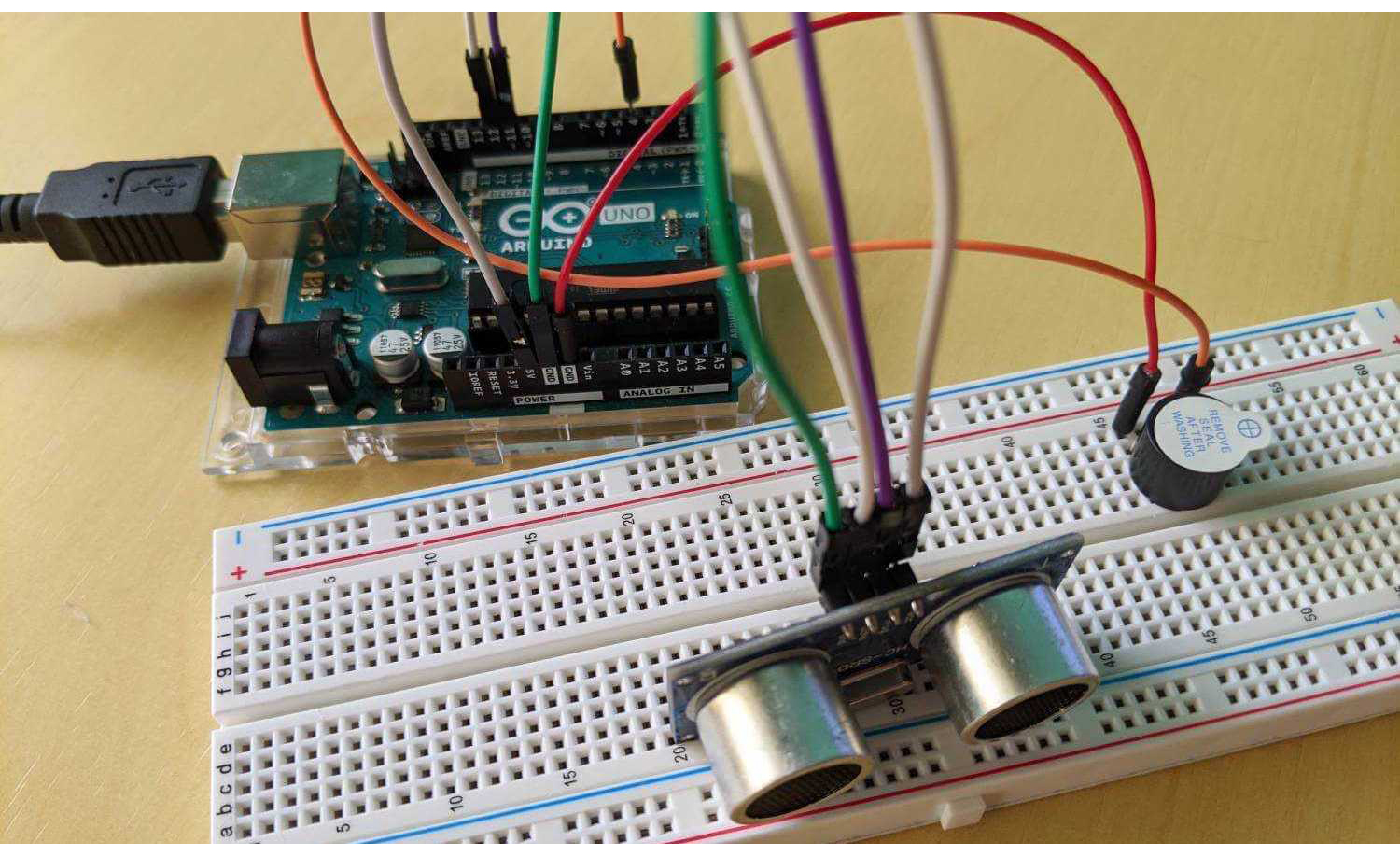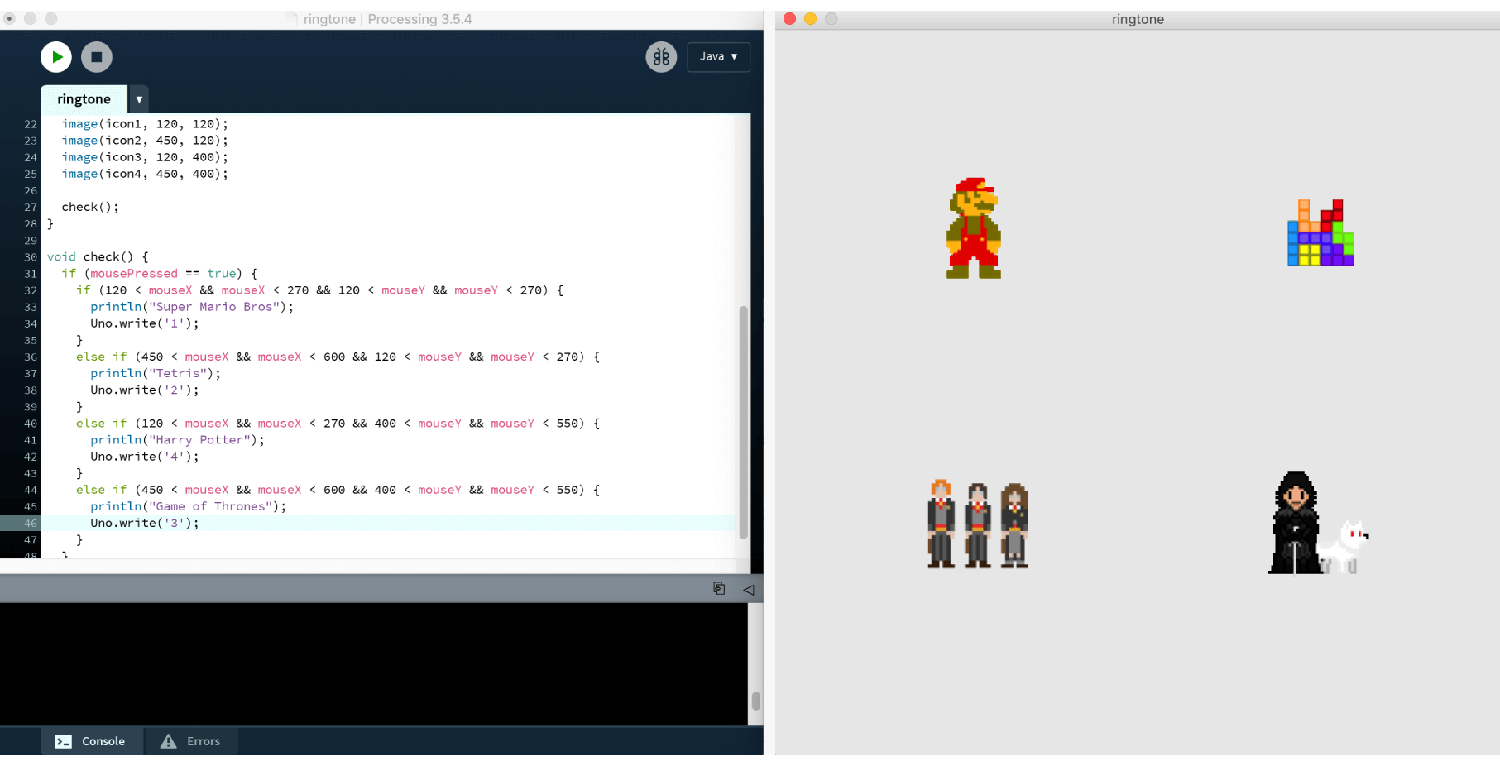I want to try serial communication from Processing to Arduino by developing a simple Processing app controlling a passive buzzer. The app plays the classic theme songs of Super Mario, Harry Potter, Game of Thrones, and Tetris.
Arduino program
Hardware
There are two types of piezoelectric buzzer: an active buzzer that has additional circuitry in it which makes it simpler to control (turn on/off) but limits the buzzer to only one tone; and a passive buzzer which can make different tones, but the MCU has to provide an electronic signal at a desired frequency and that frequency will determine the tone. Here is a nice tutorial for simple controls of ARTC 4330/5330 passive buzzer.

The connection is as easy as the wiring above: (-) pin of the buzzer was connected to GND pin of Arduino Uno, and digital pin 4 of Arduino Uno was connected to the (+) pin of the buzzer.
Software
After looking for their melodies and tempos online, I found this super guay repository with a collection of many of my favorite childhood theme songs. However, the way the durations were calculated and how the music was composed vary. Hence, I had to rewrite a bit.
/*
* convert notes to frequency
*/
#define NOTE_B0 31
#define NOTE_C1 33
#define NOTE_CS1 35
#define NOTE_D1 37
#define NOTE_DS1 39
#define NOTE_E1 41
#define NOTE_F1 44
#define NOTE_FS1 46
#define NOTE_G1 49
#define NOTE_GS1 52
#define NOTE_A1 55
#define NOTE_AS1 58
#define NOTE_B1 62
#define NOTE_C2 65
#define NOTE_CS2 69
#define NOTE_D2 73
#define NOTE_DS2 78
#define NOTE_E2 82
#define NOTE_F2 87
#define NOTE_FS2 93
#define NOTE_G2 98
#define NOTE_GS2 104
#define NOTE_A2 110
#define NOTE_AS2 117
#define NOTE_B2 123
#define NOTE_C3 131
#define NOTE_CS3 139
#define NOTE_D3 147
#define NOTE_DS3 156
#define NOTE_E3 165
#define NOTE_F3 175
#define NOTE_FS3 185
#define NOTE_G3 196
#define NOTE_GS3 208
#define NOTE_A3 220
#define NOTE_AS3 233
#define NOTE_B3 247
#define NOTE_C4 262
#define NOTE_CS4 277
#define NOTE_D4 294
#define NOTE_DS4 311
#define NOTE_E4 330
#define NOTE_F4 349
#define NOTE_FS4 370
#define NOTE_G4 392
#define NOTE_GS4 415
#define NOTE_A4 440
#define NOTE_AS4 466
#define NOTE_B4 494
#define NOTE_C5 523
#define NOTE_CS5 554
#define NOTE_D5 587
#define NOTE_DS5 622
#define NOTE_E5 659
#define NOTE_F5 698
#define NOTE_FS5 740
#define NOTE_G5 784
#define NOTE_GS5 831
#define NOTE_A5 880
#define NOTE_AS5 932
#define NOTE_B5 988
#define NOTE_C6 1047
#define NOTE_CS6 1109
#define NOTE_D6 1175
#define NOTE_DS6 1245
#define NOTE_E6 1319
#define NOTE_F6 1397
#define NOTE_FS6 1480
#define NOTE_G6 1568
#define NOTE_GS6 1661
#define NOTE_A6 1760
#define NOTE_AS6 1865
#define NOTE_B6 1976
#define NOTE_C7 2093
#define NOTE_CS7 2217
#define NOTE_D7 2349
#define NOTE_DS7 2489
#define NOTE_E7 2637
#define NOTE_F7 2794
#define NOTE_FS7 2960
#define NOTE_G7 3136
#define NOTE_GS7 3322
#define NOTE_A7 3520
#define NOTE_AS7 3729
#define NOTE_B7 3951
#define NOTE_C8 4186
#define NOTE_CS8 4435
#define NOTE_D8 4699
#define NOTE_DS8 4978
/*
* pin variables
*/
#define buzzer A0
/*
* data received from Processing app
*/
char songId;
/*
* melody and tempo of Super Mario
*/
int mario[] = {
NOTE_E7, NOTE_E7, 0, NOTE_E7, 0, NOTE_C7, NOTE_E7, 0, NOTE_G7, 0, 0, 0, NOTE_G6, 0, 0, 0,
NOTE_C7, 0, 0, NOTE_G6, 0, 0, NOTE_E6, 0, 0, NOTE_A6, 0, NOTE_B6, 0, NOTE_AS6, NOTE_A6, 0,
NOTE_G6, NOTE_E7, NOTE_G7, NOTE_A7, 0, NOTE_F7, NOTE_G7, 0, NOTE_E7, 0, NOTE_C7, NOTE_D7, NOTE_B6, 0, 0
};
int mario_tempo[] = {
8, 8, 8, 8, 8, 8, 8, 8, 8, 8, 8, 8, 8, 8, 8, 8,
8, 8, 8, 8, 8, 8, 8, 8, 8, 8, 8, 8, 8, 8, 8, 8,
6, 6, 6, 8, 8, 8, 8, 8, 8, 8, 8, 8, 8, 8, 8
};
/*
* melody and tempo of Tetris
*/
int tetris[] = {
NOTE_E5, NOTE_B4, NOTE_C5, NOTE_D5, NOTE_C5, NOTE_B4, NOTE_A4, NOTE_A4, NOTE_C5, NOTE_E5, NOTE_D5, NOTE_C5,
NOTE_B4, NOTE_C5, NOTE_D5, NOTE_E5, NOTE_C5, NOTE_A4, NOTE_A4, NOTE_D5, NOTE_F5, NOTE_A5, NOTE_G5, NOTE_F5,
NOTE_E5, NOTE_C5, NOTE_E5, NOTE_D5, NOTE_C5, NOTE_B4, NOTE_B4, NOTE_C5, NOTE_D5, NOTE_E5, NOTE_C5, NOTE_A4, NOTE_A4, 0
};
int tetris_tempo[] = {
4, 8, 8, 4, 8, 8, 4, 8, 8, 4, 8, 8, -4, 8, 4, 4, 4, 4, 3,
-4, 8, 4, 8, 8, -4, 8, 4, 8, 8, 4, 8, 8, 4, 4, 4, 4, 4, 4
};
/*
* melody and tempo of Game of Thrones
*/
int got[] = {
NOTE_G4, NOTE_C4, NOTE_DS4, NOTE_F4, NOTE_G4, NOTE_C4, NOTE_E4, NOTE_F4,
NOTE_G4, NOTE_C4, NOTE_DS4, NOTE_F4, NOTE_D4, NOTE_G3, NOTE_AS3, NOTE_C4, NOTE_D4,
NOTE_G3, NOTE_AS3, NOTE_C4, NOTE_D4, NOTE_F4, NOTE_AS3, NOTE_DS4, NOTE_D4, NOTE_F4,
NOTE_AS3, NOTE_DS4, NOTE_D4, NOTE_C4
};
int got_tempo[] = {
2, 2, 1, 1, 2, 2, 1, 1, 2, 2, 1, 1, 2,
2, 1, 1, 2, 2, 1, 1, 4,
4, 4, 1, 1, 4, 4, 1, 1, 4
};
/*
* melody and tempo of Harry Potter
*/
int harrypotter[] = {
NOTE_D4, NOTE_G4, NOTE_AS4, NOTE_A4, NOTE_G4, NOTE_D5, NOTE_C5, NOTE_A4, NOTE_G4, NOTE_AS4, NOTE_A4,
NOTE_F4, NOTE_GS4, NOTE_D4, NOTE_D4, NOTE_G4, NOTE_AS4, NOTE_A4, NOTE_G4, NOTE_D5,
NOTE_F5, NOTE_E5, NOTE_DS5, NOTE_B4, NOTE_DS5, NOTE_D5, NOTE_CS5, NOTE_CS4, NOTE_B4, NOTE_G4
};
int harrypotter_tempo[] = {
4, -4, 8, 4, 2, 4, -2, -2, -4, 8, 4, 2, 4, -2, 4,
-4, 8, 4, 2, 4, 2, 4, 2, 4,
-4, 8, 4, 2, 4, -2
};
/*
* begin serial communication at the same baud rate with the Processing program
*/
void setup(void)
{
pinMode(buzzer, OUTPUT);
Serial.begin(115200);
}
/*
* receive songId from Processing app
* and pass it as an argument to sing() function
*/
void loop()
{
if (Serial.available())
{
songId = Serial.read();
}
sing(songId);
// avoid repeated songs
songId = '0';
delay(2000);
}
/*
* use tone() to play songs with the buzzer: targeted pin, frequency, duration
* songId is the parameter
*/
void sing(char id)
{
if (id == '1')
{
int duration = 0;
for (int i = 0; i < (sizeof(mario) / sizeof(int)); i++) {
// to calculate the note duration, take one second divided by the note type
// e.g. quarter note = 1000 / 4, eighth note = 1000/8, etc.
duration = 1000/mario_tempo[i];
tone(buzzer, mario[i], duration);
// to distinguish the notes, set a minimum time between them
delay(duration * 1.30);
// stop the tone playing
noTone(buzzer);
}
delay(10);
}
else if (id == '2')
{
int duration = 0;
for (int i = 0; i < (sizeof(tetris) / sizeof(int)); i++) {
duration = 1800 / abs(tetris_tempo[i]);
if (tetris_tempo[i] < 0) {
// notes are represented with positive durations are regular note, just proceed
// dotted notes are represented with negative durations
// increases the duration in half for dotted notes
duration *= 1.5;
}
tone(buzzer, tetris[i], duration);
delay(duration * 1.10);
noTone(buzzer);
}
delay(10);
}
else if (id == '3')
{
int duration = 0;
for (int i = 0; i < (sizeof(got) / sizeof(int)); i++){
duration = got_tempo[i] * 250;
tone(buzzer, got[i], duration);
delay(duration);
noTone(buzzer);
}
delay(10);
}
else if (id == '4')
{
int duration = 0;
for (int i = 0; i < (sizeof(harrypotter) / sizeof(int)); i++){
duration = 1600 / abs(harrypotter_tempo[i]);
if (harrypotter_tempo[i] < 0) {
duration *= 1.3;
}
tone(buzzer, harrypotter[i], duration);
delay(duration * 1.10);
noTone(buzzer);
}
delay(10);
}
}
Processing program
Processing is a flexible software sketchbook that allows its users to write code with Java-based syntax within the context of the visual arts. The Serial library of Processing is used to open a serial communication with the Arduino Uno board through the USB port, and then we can call write() functions to send the ID of the selected song to the Arduino program.

/*
* declare an object of Serial class
* for sending and receiving data over serial communication protocol
*/
import processing.serial.*;
Serial Uno;
/*
* declare the icons used
*/
PImage icon1;
PImage icon2;
PImage icon3;
PImage icon4;
/*
* load icons and open the serial connection
*/
void setup() {
size(700, 700);
background(230);
/*
* load images in the "data" folder
*/
icon1 = loadImage("mario.png");
icon2 = loadImage("tetris.png");
icon3 = loadImage("harry-potter.png");
icon4 = loadImage("got.png");
/*
* add arguments for the serial communication: parent, port name, baud rate
* use the same baud rate with the Arduino program
*/
Uno = new Serial(this, "/dev/cu.usbmodem14301", 115200);
}
/*
* similar to loop() in Arduino
*/
void draw() {
image(icon1, 120, 120);
image(icon2, 450, 120);
image(icon3, 120, 400);
image(icon4, 450, 400);
}
/*
* function called whenever the mouse is clicked
*/
void mousePressed() {
Uno.write(check());
Uno.clear();
}
/*
* send the id of the song selected to the Arduino program
*/
char check() {
if (120 < mouseX && mouseX < 270 && 120 < mouseY && mouseY < 270) {
println("Super Mario Bros");
return '1';
}
else if (450 < mouseX && mouseX < 600 && 120 < mouseY && mouseY < 270) {
println("Tetris");
return '2';
}
else if (120 < mouseX && mouseX < 270 && 400 < mouseY && mouseY < 550) {
println("Harry Potter");
return '4';
}
else if (450 < mouseX && mouseX < 600 && 400 < mouseY && mouseY < 550) {
println("Game of Thrones");
return '3';
}
else {
return '0';
}
}